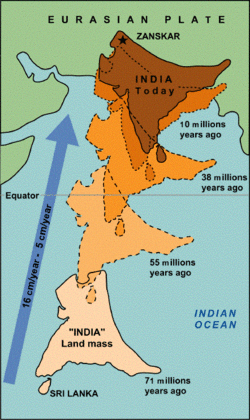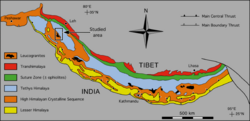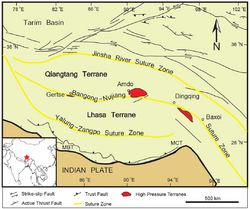Earth:Geology of the Himalaya

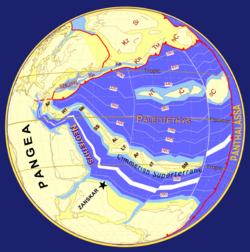
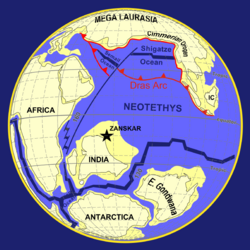
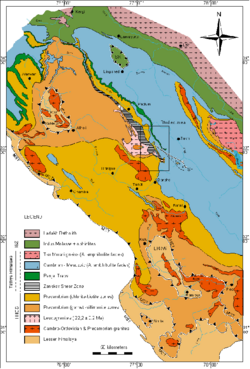

The geology of the Himalayas is a record of the most dramatic and visible creations of the immense mountain range formed by plate tectonic forces and sculpted by weathering and erosion. The Himalayas, which stretch over 2400 km between the Namcha Barwa syntaxis in Tibet and the Nanga Parbat syntaxis in Kashmir, are the result of an ongoing orogeny — the collision of the continental crust of two tectonic plates namely the Indian Plate thrusting into the Eurasian Plate. The Himalaya-Tibet region supplies fresh water for more than one-fifth of the world population, and accounts for a quarter of the global sedimentary budget. Topographically, the belt has many superlatives: the highest rate of uplift (nearly 10 mm/year at Nanga Parbat), the highest relief (8848 m at Mt. Everest Chomolangma), among the highest erosion rates at 2–12 mm/yr,[4] the source of some of the greatest rivers and the highest concentration of glaciers outside of the polar regions. This last feature earned the Himalaya its name, originating from the Sanskrit for "the abode of the snow".
From south to north the Himalaya (Himalaya orogen) is divided into 4 parallel tectonostratigraphic zones and 5 thrust faults which extend across the length of Himalaya orogen. Each zone, flanked by the thrust faults on its north and south, has stratigraphy (type of rocks and their layering) different from the adjacent zones. From south to north, the zones and the major faults separating them are the Main Frontal Thrust (MFT), Subhimalaya Zone (also called Sivalik), Main Boundary Thrust (MBT), Lesser Himalaya (further subdivided into the "Lesser Himalayan Sedimentary Zone (LHSZ) and the Lesser Himalayan Crystalline Nappes (LHCN)), Main Central thrust (MCT), Higher (or Greater) Himalayan crystallines (HHC), South Tibetan detachment system (STD), Tethys Himalaya (TH), and the Indus‐Tsangpo Suture Zone (ISZ).[5] North of this lies the transhimalaya in Tibet which is outside the Himalayas. Himalaya has Indo-Gangetic Plain in south, Pamir Mountains in west in Central Asia, and Hengduan Mountains in east on China–Myanmar border.
From east to west the Himalayas are divided into 3 regions, Eastern Himalaya, Central Himalaya, and Western Himalaya, which collectively house several nations and states.
Making of the Himalayas
During Late Precambrian and the Palaeozoic, the Indian subcontinent, bounded to the north by the Cimmerian Superterranes, was part of Gondwana and was separated from Eurasia by the Paleo-Tethys Ocean (Fig. 1). During that period, the northern part of India was affected by a late phase of the Pan-African orogeny which is marked by an unconformity between Ordovician continental conglomerates and the underlying Cambrian marine sediments. Numerous granitic intrusions dated at around 500 Ma are also attributed to this event.
In the Early Carboniferous, an early stage of rifting developed between the Indian subcontinent and the Cimmerian Superterranes. During the Early Permian, this rift developed into the Neotethys ocean (Fig. 2). From that time on, the Cimmerian Superterranes drifted away from Gondwana towards the north. Nowadays, Iran, Afghanistan and Tibet are partly made up of these terranes.
In the Norian (210 Ma), a major rifting episode split Gondwana in two parts. The Indian continent became part of East Gondwana, together with Australia and Antarctica. However, the separation of East and West Gondwana, together with the formation of oceanic crust, occurred later, in the Callovian (160-155 Ma). The Indian plate then broke off from Australia and Antarctica in the Early Cretaceous (130-125 Ma) with the opening of the "South Indian Ocean" (Fig. 3).
In the Late Cretaceous (84 Ma), the Indian plate began its very rapid northward drift covering a distance of about 6000 km,[6] with the oceanic-oceanic subduction continuing until the final closure of the oceanic basin and the obduction of oceanic ophiolite onto India and the beginning of continent-continent tectonic interaction starting at about 65 Ma in the Central Himalaya.[7] The change of the relative speed between the Indian and Asian plates from very fast (18-19.5 cm/yr) to fast (4.5 cm/yr) at about 55 Ma[8] is circumstantial support for collision then. Since then there has been about 2500 km[9][10][11][12] of crustal shortening and rotating of India by 45° counterclockwise in the Northwestern Himalaya[13] to 10°-15° counterclockwise in North Central Nepal[14] relative to Asia (Fig. 4).
While most of the oceanic crust was "simply" subducted below the Tibetan block during the northward motion of India, at least three major mechanisms have been put forward, either separately or jointly, to explain what happened, since collision, to the 2500 km of "missing continental crust".
- The first mechanism also calls upon the subduction of the Indian continental crust below Tibet.
- Second is the extrusion or escape tectonics mechanism (Molnar Tapponnier) which sees the Indian plate as an indenter that squeezed the Indochina block out of its way.
- The third proposed mechanism is that a large part (~1000 km (Dewey, Cande & Pitman 1989) or ~800 to ~1200 km[15]) of the 2500 km of crustal shortening was accommodated by thrusting and folding of the sediments of the passive Indian margin together with the deformation of the Tibetan crust.
Even though it is more than reasonable to argue that this huge amount of crustal shortening most probably results from a combination of these three mechanisms, it is nevertheless the last mechanism which created the high topographic relief of the Himalaya.
The ongoing active collision of the Indian and Eurasian continental plates challenges one hypothesis for plate motion which relies on subduction.
Major tectonic subdivisions of the Himalaya
One of the most striking aspects of the Himalayan orogen is the lateral continuity of its major tectonic elements. The Himalaya is classically divided into four tectonic units that can be followed for more than 2400 km along the belt (Fig. 5 and Fig. 7).[lower-alpha 3]
Sub-Himalayan (Churia Hills or Sivaliks) tectonic plate
The Sub-Himalayan tectonic plate is sometimes referred to as the Cis-Himalayan tectonic plate in the older literature. It forms the southern foothills of the Himalayan Range and is essentially composed of Miocene to Pleistocene molassic sediments derived from the erosion of the Himalaya. These molasse deposits, known as the "Murree and Sivaliks Formations", are internally folded and imbricated. The Sub-Himalayan Range is thrust along the Main Frontal Thrust over the Quaternary alluvium deposited by the rivers coming from the Himalaya (Ganges, Indus, Brahmaputra and others), which demonstrates that the Himalaya is still a very active orogen.
Lesser Himalaya (LH) tectonic plate
The Lesser Himalaya (LH) tectonic plate is mainly formed by Upper Proterozoic to lower Cambrian detrital sediments from the passive Indian margin intercalated with some granites and acid volcanics (1840 ±70 Ma[16]). These sediments are thrust over the Sub-himalayan range along the Main Boundary Thrust (MBT). The Lesser Himalaya often appears in tectonic windows (Kishtwar or Larji-Kulu-Rampur windows) within the High Himalaya Crystalline Sequence.
Central Himalayan Domain, (CHD) or High Himalaya tectonic plate
The Central Himalayan Domain forms the backbone of the Himalayan orogen and encompasses the areas with the highest topographic relief (highest peaks). It is commonly separated into four zones.
High Himalayan Crystalline Sequence (HHCS)
Approximately 30 different names exist in the literature to describe this unit; the most frequently found equivalents are "Greater Himalayan Sequence", "Tibetan Slab" and "High Himalayan Crystalline". It is a 30-km-thick, medium- to high-grade metamorphic sequence of metasedimentary rocks which are intruded in many places by granites of Ordovician (c. 500 Ma) and early Miocene (c. 22 Ma) age. Although most of the metasediments forming the HHCS are of late Proterozoic to early Cambrian age, much younger metasediments can also be found in several areas, e.g. Mesozoic in the Tandi syncline of Nepal and Warwan Valley of Kistwar in Kashmir, Permian in the "Tschuldo slice", Ordovician to Carboniferous in the "Sarchu area" on Leh-Manali Highway. It is now generally accepted that the metasediments of the HHCS represent the metamorphic equivalents of the sedimentary series forming the base of the overlying "Tethys Himalaya". The HHCS forms a major nappe which is thrust over the Lesser Himalaya along the "Main Central Thrust" (MCT).
Tethys Himalaya (TH)
The Tethys Himalaya is an approximately 100-km-wide synclinorium formed by strongly folded and imbricated, weakly metamorphosed sedimentary series. Several nappes, termed the "North Himalayan Nappes",[17] have also been described within this unit. An almost complete stratigraphic record ranging from the Upper Proterozoic to the Eocene is preserved within the sediments of the TH. Stratigraphic analysis of these sediments yields important indications on the geological history of the northern continental margin of the Indian sub-continent from its Gondwanian evolution to its continental collision with Eurasia. The transition between the generally low-grade sediments of the "Tethys Himalaya" and the underlying low- to high-grade rocks of the "High Himalayan Crystalline Sequence" is usually progressive. But in many places along the Himalayan belt, this transition zone is marked by a major structure, the "Central Himalayan Detachment System", also known as the "South Tibetan Detachment System" or "North Himalayan Normal Fault", which has indicators of both extension and compression. See ongoing geologic studies section below.
Nyimaling-Tso Morari Metamorphic Dome (NTMD)
'"Nyimaling-Tso Morari Metamorphic Dome" in the Ladakh region, the "Tethys Himalaya synclinorium" passes gradually to the north in a large dome of greenschist to eclogitic metamorphic rocks. As with the HHCS, these metamorphic rocks represent the metamorphic equivalent of the sediments forming the base of the Tethys Himalaya. The "Precambrian Phe Formation" is also here intruded by several Ordovician (c. 480 Ma[18]) granites.
Lamayuru and Markha Units (LMU)
The Lamayuru and Markha Units are formed by flyschs and olistholiths deposited in a turbiditic environment, on the northern part of the Indian continental slope and in the adjoining Neotethys basin. The age of these sediments ranges from Late Permian to Eocene.
Indus Suture Zone (ISZ) (or Yarlung-Tsangpo Suture Zone) tectonic plate
ISZ, also spelled "Indus-Yarlung suture zone", "Yarlung-Zangpo Suture Zone" or "Yarlung-Tsangpo Suture Zone", defines the zone of collision between the Indian Plate and the Ladakh Batholith (also Transhimalaya or Karakoram-Lhasa Block) to the north. This suture zone is formed by:
- "Ophiolite Mélanges": are composed of an intercalation of flysch and ophiolites from the Neotethys oceanic crust.
- "Dras Volcanics": are relicts of a "Late Cretaceous" to "Late Jurassic" volcanic island arc and consist of basalts, dacites, volcanoclastites, pillow lavas and minor radiolarian cherts
- "Indus Molasse": is a continental clastic rock sequence (with rare interbeds of marine saltwater sediments) comprising alluvial fan, braided stream and fluvio-lacustrine sediments derived mainly from the Ladakh batholith but also from the suture zone itself and the "Tethyan Himalaya". These molasses are post-collisional and thus Eocene to post-Eocene.
- "Indus Suture Zone": represents the northern limit of the Himalaya. Further to the North is the so-called "Transhimalaya", or more locally "Ladakh Batholith", which corresponds essentially to an active margin of Andean type. Widespread volcanism in this volcanic arc was caused by the melting of the mantle at the base of the Tibetan bloc, triggered by the dehydration of the subducting Indian oceanic crust.
See also
Localized geology and geomorphology topics for various parts of the Himalaya are discussed on other pages:
- Geology of Nepal
- Zanskar is a subdistrict of the Kargil district, which lies in the eastern half of the Indian union territory of Ladakh.
- Indus River - the erosion at Nanga Parbat is causing rapid uplifting of lower crustal rocks
- Mount Everest
- Sutlej River - similar small scale erosion to the Indus
- Tibetan Plateau to the North (also discussed in Geography of Tibet)
- Paleotethys
- Karakoram fault system - major active fault system within the Himalaya
- Main Himalayan Thrust - the root thrust that underlies the Himalaya
Notes
- ↑ A more modern paleogeographic reconstruction of the Early Permian can be found at "Paleotethys". Université de Lausanne. http://www.unil.ch/igp/page22666_en.html..
- ↑ A more modern paleogeographic reconstruction of the Permian-Triassic boundary, see "Neotethys". Université de Lausanne. http://www.unil.ch/igp/page22667_en.html..
- ↑ The fourfold division of Himalayan units has been used since the work of (Blanford Medlicott) and (Heim Gansser).
References
Citations
- ↑ Stampfli 2000.
- ↑ Stampfli et al. 2001.
- ↑ Stampfli & Borel 2002.
- ↑ Burbank et al. 1996.
- ↑ DiPietro & Pogue 2004.
- ↑ Dèzes 1999.
- ↑ Ding, Kapp & Wan 2005.
- ↑ Klootwijk et al. 1992.
- ↑ Achache, Courtillot & Xiu 1984.
- ↑ Patriat & Achache 1984.
- ↑ Besse et al. 1984.
- ↑ Besse & Courtillot 1988.
- ↑ Klootwijk, Conaghan & Powell 1985.
- ↑ Bingham & Klootwijk 1980.
- ↑ Le Pichon, Fournier & Jolivet 1992.
- ↑ Frank, Gansser & Trommsdorff 1977.
- ↑ Steck et al. 1993, [full citation needed].
- ↑ Girard & Bussy 1998.
Sources
- Achache, José; Courtillot, Vincent; Xiu, Zhou Yao (1984). "Paleogeographic and tectonic evolution of southern Tibet since Middle Cretaceous time: New paleomagnetic data and synthesis". Journal of Geophysical Research 89 (B12): 10311–10340. doi:10.1029/JB089iB12p10311. Bibcode: 1984JGR....8910311A.
- Besse, J.; Courtillot, V.; Pozzi, J.P.; Westphal, M.; Zhou, Y.X. (18 October 1984). "Palaeomagnetic estimates of crustal shortening in the Himalayan thrusts and Zangbo Suture". Nature 311 (5987): 621–626. doi:10.1038/311621a0. Bibcode: 1984Natur.311..621B.
- Besse, Jean; Courtillot, Vincent (10 October 1988). "Paleogeographic maps of the continents bordering the Indian Ocean since the Early Jurassic". Journal of Geophysical Research 93 (B10): 11791–11808. doi:10.1029/JB093iB10p11791. ISSN 0148-0227. Bibcode: 1988JGR....9311791B.
- Bingham, Douglas K.; Klootwijk, Chris T. (27 March 1980). "Palaeomagnetic constraints on Greater India's underthrusting of the Tibetan Plateau". Nature 284 (5754): 336–338. doi:10.1038/284336a0. Bibcode: 1980Natur.284..336B.
- Blanford, W.T.; Medlicott, H.B. (1879). "A manual of the geology of India". Nature (Calcutta) 20 (504): 191. doi:10.1038/020191a0. Bibcode: 1879Natur..20..191H. https://zenodo.org/record/1890197.
- Brookfield, M.E. (1993). "The Himalaya passive margin from Precambrian to Cretaceous times". Sedimentary Geology 84 (1–4): 1–35. doi:10.1016/0037-0738(93)90042-4. Bibcode: 1993SedG...84....1B.
- Burbank, Douglas W.; Leland, John; Fielding, Eric; Anderson, Robert S.; Brozovic, Nicholas; Reid, Mary R.; Duncan, Christopher (8 February 1996). "Bedrock incision, rock uplift and threshold hillslopes in the northwestern Himalayas". Nature 379 (6565): 505–510. doi:10.1038/379505a0. Bibcode: 1996Natur.379..505B.
- Dewey, J.F. (1988). "Extensional collapse of orogens". Tectonics 7 (6): 1123–1139. doi:10.1029/TC007i006p01123. Bibcode: 1988Tecto...7.1123D.
- Dewey, J.F.; Cande, S.; Pitman III, W.C. (1989). "Tectonic evolution of the Indian/Eurasia Collision Zone". Eclogae Geologicae Helvetiae 82 (3): 717–734.
- Dèzes, Pierre (1999). Tectonic and metamorphic Evolution of the Central Himalayan Domain in Southeast Zanskar (Kashmir, India). Mémoires de Géologie (PhD thesis). 32. University of Lausanne. p. 149. ISSN 1015-3578.
- Ding, Lin; Kapp, Paul; Wan, Xiaoqiao (6 May 2005). "Paleocene-Eocene record of ophiolite obduction and initial India-Asia collision, south central Tibet". Tectonics 24 (3): TC3001. doi:10.1029/2004TC001729. Bibcode: 2005Tecto..24.3001D.
- DiPietro, Joseph A.; Pogue, Kevin R. (September 2004). "Tectonostratigraphic subdivisions of the Himalaya: A view from the west". Tectonics (American Geophysical Union Publications) 23 (5). doi:10.1029/2003TC001554.
- Le Fort, P.; Cronin, V. S. (1 September 1988). "Granites in the Tectonic Evolution of the Himalaya, Karakoram and Southern Tibet". Philosophical Transactions of the Royal Society of London. Series A, Mathematical and Physical Sciences 326 (1589): 281–299. doi:10.1098/rsta.1988.0088. Bibcode: 1988RSPTA.326..281F.
- Frank, W.; Gansser, A.; Trommsdorff, V. (1977). "Geological observations in the Ladakh area (Himalayas); a preliminary report". Schweizerische Mineralogische und Petrographische Mitteilungen Bulletin 57 (1): 89–113.
- Girard, M.; Bussy, F. (1998). "Late Pan-African magmatism in Himalaya: new geochronological and geochemical data from the Ordovician Tso Morari metagranites (Ladakh, NW India)". Schweizerische Mineralogische und Petrographische Mitteilungen Bulletin 79: 399–418.
- Heim, A.; Gansser, A. (1939). "Central Himalaya; geological observations of the Swiss expedition 1936". Schweizer. Naturf. Ges., Denksch. 73 (1): 245.
- Klootwijk, C.T.; Conaghan, P.J.; Powell, C.McA. (October 1985). "The Himalayan Arc: large-scale continental subduction, oroclinal bending and back-arc spreading". Earth and Planetary Science Letters 75 (2–3): 167–183. doi:10.1016/0012-821X(85)90099-8. Bibcode: 1985E&PSL..75..167K.
- Klootwijk, Chris T.; Gee, Jeff S.; Peirce, John W.; Smith, Guy M.; McFadden, Phil L. (May 1992). "An early India-Asia contact: Paleomagnetic constraints from Ninetyeast Ridge, ODP Leg 121". Geology 20 (5): 395–398. doi:10.1130/0091-7613(1992)020<0395:AEIACP>2.3.CO;2. Bibcode: 1992Geo....20..395K.
- Molnar, P.; Tapponnier, P. (1975). "Cenozoic tectonics of Asia; effects of a continental collision". Science 189 (4201): 419–426. doi:10.1126/science.189.4201.419. PMID 17781869. Bibcode: 1975Sci...189..419M.
- Patriat, Philippe; Achache, José (18 October 1984). "India-Eurasia collision chronology has implications for crustal shortening and driving mechanism of plates". Nature 311 (5987): 615–621. doi:10.1038/311615a0. Bibcode: 1984Natur.311..615P.
- Le Pichon, Xavier; Fournier, Marc; Jolivet, Laurent (1992). "Kinematics, topography, shortening, and extrusion in the India-Eurasia collision". Tectonics 11 (6): 1085–1098. doi:10.1029/92TC01566. Bibcode: 1992Tecto..11.1085L.
- Ricou, L.M. (1994). "Tethys reconstructed: plates, continental fragments and their Boundaries since 260 Ma from Central America to South-eastern Asia". Geodinamica Acta 7 (4): 169–218. doi:10.1080/09853111.1994.11105266.
- Stampfli, G.M.; Mosar, J.; Favre, P.; Pillevuit, A.; Vannay, J.-C. (1998). "Permo-Triassic evolution of the western Tethyan realm: the Neotethys/east-Mediterranean basin connection". PeriThetys 3.
- Stampfli, G.M. (2000). E. Bozkurt. ed. "Tectonics and magmatism in Turkey and surrounding area". Geological Society of London, Special Publications 173: 1–23. doi:10.1144/GSL.SP.2000.173.01.01.
- Stampfli, G.M.; Mosar, J.; Favre, P.; Pillevuit, A.; Vannay, J.-C. (2001). "Permo-Mesozoic evolution of the western Tethyan realm: the Neotethys/East- Mediterranean connection". in P.A. Ziegler. PeriTethys memoir 6: Peritethyan rift/wrench basins and passive margins. IGCP 369. Mém. Museum Nat. Hist. Nat. 186. pp. 51–108.
- Stampfli, G.M.; Borel, G.D. (28 February 2002). "A plate tectonic model for the Paleozoic and Mesozoic constrained by dynamic plate boundaries and restored synthetic oceanic isochrons". Earth and Planetary Science Letters 196 (1): 17–33. doi:10.1016/S0012-821X(01)00588-X. Bibcode: 2002E&PSL.196...17S.
- Stampfli, GM; Borel, GD (2004). "The TRANSMED Transects in Space and Time: Constraints on the Paleotectonic Evolution of the Mediterranean Domain". in Cavazza W. The TRANSMED Atlas: the Mediterranean Region from Crust to Mantle. Springer Verlag. ISBN 978-3-540-22181-4. https://books.google.com/books?id=Z_GS4C3pOf8C&q=The+TRANSMED+Transects+in+Space+and+Time:+Constraints+on+the+Paleotectonic+Evolution+of+the+Mediterranean+Domain&pg=PA53.
- Steck, A.; Spring, L.; Vannay, J.C.; Masson, H.; Stutz, E.; Bucher, H.; Marchant, R.; Tièche, J.C. (1993a). "Geological Transect Across the Northwestern Himalaya in eastern Ladakh and Lahul (A Model for the Continental Collision of India and Asia)". Eclogae Geologicae Helvetiae 86 (1): 219–263. http://www.pim.uzh.ch/_files/_downloads/transect_bucher_1993.pdf.
- Steck, A.; Spring, L.; Vannay, J.C.; Masson, H.; Bucher, H.; Stutz, E.; Marchant, R.; Tieche, J.C. (1993b). "The tectonic evolution of the northwestern Himalaya in eastern Ladakh and Lahul, India, in Himalayan Tectonics". Geological Society, London, Special Publications 74 (1): 265–276. doi:10.1144/GSL.SP.1993.074.01.19. ISSN 0305-8719. Bibcode: 1993GSLSP..74..265S.
- Yin, An (May 2006). "Cenozoic tectonic evolution of the Himalayan orogen as constrained by along-strike variation of structural geometry, exhumation history, and foreland sedimentation". Earth-Science Reviews 76 (1–2): 1–131. doi:10.1016/j.earscirev.2005.05.004. ISSN 0012-8252. Bibcode: 2006ESRv...76....1Y.
External links
- Catlos, Elizabeth Jacqueline (2000). Geochronologic and Thermobarometric Constraints on the Evolution of the Main Central Thrust, Himalayan Orogen. PhD Thesis. University of California. http://www2.ess.ucla.edu/~manning/pdfs/c01.pdf.
- "Geology and Petrographic study of the area from Chiraundi Khola to Thulo Khola, Dhading/Nawakot district, central Nepal". MS Thesis by Gyanendra Gurung
- India-Asia Continental Collision, animations by Tanya Atwater
- Granitoids of the Himalayan Collisional Belt. Special Edition of "The Journal of the Virtual Explorer"
- Reconstruction of the evolution of the Alpine-Himalayan orogeny. Special Edition of "The Journal of the Virtual Explorer"
- "Engineering Geology of Nepal"
- Wadia Institute of Himalayan Geology, Dehradun, India, main page
